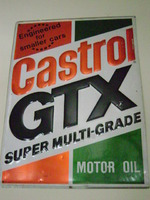 Those of us that own vintage iron are very familiar with the challenge of keeping all of the oil in the compartments that it was originally designed to remain in. The engine, the gearbox, and the differential were generally the areas intended to contain large amounts of oil in most engines, as it was a basic lubricant and sometimes a method of cooling as well. For 2-Stroke machines, oil was mixed with fuel, so it went everywhere, but that’s another discussion. The designs were basic. Either the engine and gearbox shared the same oil, or, the engine and gearbox each had their own sealed compartments containing lubricants. Some designs combined gearbox and differential into a transaxle, making those one item, but you get the idea. Since oil was used primarily as a lubricant or coolant, everyone agreed that keeping the vast majority of it inside the compartments was preferred. And therein lies a basic physical challenge for the owners of vintage vehicles, which gives rise to philosophical, anthropological, and economic questions as well.
Those of us that own vintage iron are very familiar with the challenge of keeping all of the oil in the compartments that it was originally designed to remain in. The engine, the gearbox, and the differential were generally the areas intended to contain large amounts of oil in most engines, as it was a basic lubricant and sometimes a method of cooling as well. For 2-Stroke machines, oil was mixed with fuel, so it went everywhere, but that’s another discussion. The designs were basic. Either the engine and gearbox shared the same oil, or, the engine and gearbox each had their own sealed compartments containing lubricants. Some designs combined gearbox and differential into a transaxle, making those one item, but you get the idea. Since oil was used primarily as a lubricant or coolant, everyone agreed that keeping the vast majority of it inside the compartments was preferred. And therein lies a basic physical challenge for the owners of vintage vehicles, which gives rise to philosophical, anthropological, and economic questions as well.

Physical: Is it possible to achieve an oil-tight drive train on my vintage vehicle?
Philosophical: Should I create an oil-tight drive train on my vintage vehicle?
Anthropological: Can I learn something about people and civilizations from the degree to which my vintage vehicle’s drive train is oil-tight?
Economic: Is leaking oil an under-recognized global growth industry?
I would submit that the first question is not as simple as it first seems. Surfaces and tolerances were far from adequate early on and even if they were, heating and cooling of metals made keeping them leak-proof almost impossible. Not knowing what to do, machinists approached the Cork Brothers of Ireland, who agreed to add the making of gaskets to their global wine stopper enterprise.  Now you know. The machinists had previously tried to work with the Accordion Bros from France, but the prototype engines made strange sounds when hot, causing the English to laugh, and a deep Anglo-Franco rift occurred causing the French to dig the English channel. But I digest…. The interesting thing about cork is that it is not waterproof or anyotherliquidproof. Even the Cork Brothers advised against holding wine bottles upside down for long periods of time, and wine is much friendlier than hot engine oil. So over time, vehicles leaked. More exotic corks and impregnated combinations ensued, the Rubbah Brothers of Kuala Lumpur were engaged, as was Uhlneed Torque and his cousin Lotta of Oslo. Eventually, metallurgy and modern materials wrestled the great oil leak monster to the oily ground it had created. While the challenge of keeping things oil-tight persisted across manufacturers and continents for a long time, the modern vehicle is largely immune.
Now you know. The machinists had previously tried to work with the Accordion Bros from France, but the prototype engines made strange sounds when hot, causing the English to laugh, and a deep Anglo-Franco rift occurred causing the French to dig the English channel. But I digest…. The interesting thing about cork is that it is not waterproof or anyotherliquidproof. Even the Cork Brothers advised against holding wine bottles upside down for long periods of time, and wine is much friendlier than hot engine oil. So over time, vehicles leaked. More exotic corks and impregnated combinations ensued, the Rubbah Brothers of Kuala Lumpur were engaged, as was Uhlneed Torque and his cousin Lotta of Oslo. Eventually, metallurgy and modern materials wrestled the great oil leak monster to the oily ground it had created. While the challenge of keeping things oil-tight persisted across manufacturers and continents for a long time, the modern vehicle is largely immune. 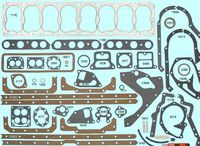 Indeed, today an oil leak of the smallest proportions is cause for alarm as it causes every LED on the dash to blink like a spiraling 747, activates all 23 airbags, and puts a pre-emptive lien on your house. But progress is not universally bad. Our vintage iron has benefitted from better gaskets and seals, and even the worst can probably be made leak-proof with some time, effort, and money.
Indeed, today an oil leak of the smallest proportions is cause for alarm as it causes every LED on the dash to blink like a spiraling 747, activates all 23 airbags, and puts a pre-emptive lien on your house. But progress is not universally bad. Our vintage iron has benefitted from better gaskets and seals, and even the worst can probably be made leak-proof with some time, effort, and money.
Which brings us to the philosophical question which I would submit is part of an even larger one. To what extent do you modernize a vintage vehicle ? Now, before you go running for your fully automatic weapons, and your machine-gun equipped Ural sidecar, consider why you own a vintage anything. Isn’t it because it harkens back to a fondly remembered time? Isn’t the era part of the allure? 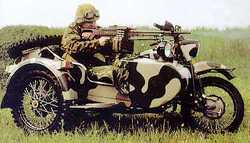 Nobody moves, nobody gets hurtAnd aren’t you keeping part of that past alive? Wasn’t it great when vehicles leaked, owners manuals admonished owners to check the oil regularly, fuel stops involved an oil check, you could find the dipstick, et cetera, et cetera, et cetera? Of course it was. Why take that away by making things more like today? Of course the other side would argue just as passionately that some parts are not so fondly remembered, and that the ability to reminisce is dependent on a vehicle you can operate safely today. Valid points both.
Nobody moves, nobody gets hurtAnd aren’t you keeping part of that past alive? Wasn’t it great when vehicles leaked, owners manuals admonished owners to check the oil regularly, fuel stops involved an oil check, you could find the dipstick, et cetera, et cetera, et cetera? Of course it was. Why take that away by making things more like today? Of course the other side would argue just as passionately that some parts are not so fondly remembered, and that the ability to reminisce is dependent on a vehicle you can operate safely today. Valid points both.

And what of the anthropological question? Well the subtle differences in how various peoples treated leaky drive trains is enlightening. My beloved Bavarian steeds from the land of teutonic efficiency were not immune to leakage. Indeed, the pushrod tubes and valve covers (2 of the most common areas prone to leakage on many vehicles) on the boxer BMWs leak right onto your boot causing you to slip once you dismount and crack your head, which makes you forget the pain of the bike falling on top of you. On a Porsche, they are conveniently located right above the exhaust heat exchangers so that smoke and fire eliminate any oil making it to the ground. Brilliant! Not forgetting the lessons of colonialism, the British took the more civilized approach of first befriending the oil leak and only later trying to stamp it out.
They contracted with the Overall Brothers and the Goggle Brothers (Misspelled Google when they emigrated to America) to design clothing suited to oil leaks and grease smudges. They also designed engines which intentionally lost all of their oil and routed leaky areas onto the chassis so that it would slow down the onset of rust in their damp climes. Most significantly, Shell and British Petroleum were created to provide enough oil to replenish wet and dry sumps alike (they later made fuel as a by-product). The French and Italians tried to divert attention from the blue smoke and long oil trails behind their vehicles, with beautiful and avant garde styling and luxurious appointments. They invented scooters, and long lunches to get around and pass the time while the oil was being replenished. The Swedish used whale blubber instead of traditional oil due to its superior ability to keep heat in at sub-zero temperatures, and better performance in 2-stroke engines. American vehicles other than Harleys did not generally leak a lot of oil, so we spilled it out of giant oil tankers to compensate. So you see there was much to be learned.
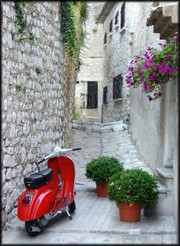
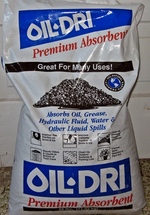 Is there an economic lesson as well? You have already seen above that many a major industry owes its beginning to a leaky sump. We didn’t even mention juggernauts such as SpeedyDri and its variants, Amoco, and U-Coat-It floor coatings. What about the makers of coveralls and funnels? How about the latex glove firms who would be gone if they still had to rely just on surgery? What about the thousands of mechanics working on oil leaks, and the diners that use that old oil to cook your fries? What about the makers of all those barrels? What about the new F1 circuits in Bahrain and Abu Dhabi? Alas, we are in a world today where almost all vehicles are oil-tight. It is no wonder then that cultures are becoming homogenized, and we are in a global economic downturn. Do your small part, and join CULO, the Citizens United to Leak Oil (name changed in Spanish speaking countries).
Is there an economic lesson as well? You have already seen above that many a major industry owes its beginning to a leaky sump. We didn’t even mention juggernauts such as SpeedyDri and its variants, Amoco, and U-Coat-It floor coatings. What about the makers of coveralls and funnels? How about the latex glove firms who would be gone if they still had to rely just on surgery? What about the thousands of mechanics working on oil leaks, and the diners that use that old oil to cook your fries? What about the makers of all those barrels? What about the new F1 circuits in Bahrain and Abu Dhabi? Alas, we are in a world today where almost all vehicles are oil-tight. It is no wonder then that cultures are becoming homogenized, and we are in a global economic downturn. Do your small part, and join CULO, the Citizens United to Leak Oil (name changed in Spanish speaking countries).
Uhlneed & Lotta Torque ?? LOL !! Fantastic piece, but you need help 😉
Mike B. turned me on to your site, and I had a great time reading till I ran out of time. Great stuff and cool R bikes. My BMW doesn’t leak oil, it’s just marking its territory !
Bxrfan
Sir ClassicVelocity,
My personal best oil leak was on my 1971 2002. Not a drop was on the floor, but it burned a quart every 500 miles. It didn’t blow much smoke, but if you were behind me, the front of your car would have a mask of oil 😉 I bought cheap oil by the case !!
Guidance,
Rich
Dear Colin,
My idea of help is a winning lottery ticket !! Thanks for your comments.
Cheers
Dear Bxrfan,
Mike B. is good people, despite not riding a BMW 😉 Glad to hear that you are a CULO member !!
Cheers
Dear Rich,
First of all thanks for the knighthood 😉 With that kind of leakage on your 02, expensive oil makes no sense. You effectively change your oil every 2000 miles and exceed all recommendations. Plus, you preserve the 02 following. Bravo !!
Nothing leaks oil like a split case horizontally opposed engine. VWs, my 912 and my 911 were all a constant battle against leaks. The fire and smoke thing is spot on!! Once I concluded that these engines were designed to leak, I felt much better 😉 Fun post.
Andy (Ayrkewl)
Dear Andy (Ayrkewl),
I have some oil-dri under one of those engines right now, and I can certainly relate. I do know of some of these engines that have no leaks, but there are not a lot of them! They seem to have cleverly placed the most leak-prone parts (oil cooler, seal, etc) in the most inaccessible of places.
ROFL !!! This is great stuff. I am slowly reading through stuff and having a helluva time. One of the best blogs I have come across.
Jeff Smolens
Jeff,
thanks for the comments. you force me to reread my older stuff!